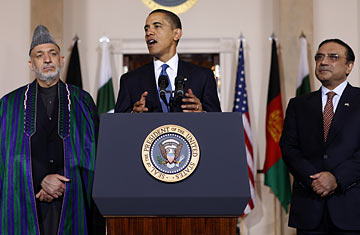
President Barack Obama makes a statement to reporters in the White House after his meeting with Afghan President Hamid Karzai, left, and Pakistani President Asif Ali Zardari.
(2 of 5)
Afghanistan: Karzai, for Better or Worse...
It's been an open secret for some years now that the U.S. deems President
Hamid Karzai incapable of delivering the sort of governance essential to
winning the war against the Taliban. His administration is notoriously
corrupt, dependent on the support of unsavory warlords — some of whom are
no more inclined to allow girls to go to school than is the Taliban — and
may possibly even be in league with drug traffickers. And yet, this week's
news that Gul Agha Sherzai, seen by many Western diplomats as a favored
challenger to Karzai, had chosen not to stand in the August election seems
to confirm that Washington has little alternative but to live with Karzai. (See a multimedia view of U.S. operations in Afghanistan)
Karzai underscored his disdain for U.S. preferences this week when he named as one of his running mates General Mohammed Fahim, a notorious warlord of the Northern Alliance. Washington had hoped to break the warlords' grip on power in Afghanistan; Karzai is for cementing the status quo. By way of consolation, the talk in Washington now is of bypassing Karzai as often as possible, working through approved members of his government in the capital and in the regions. But it's a potentially messy fix. Just as in Vietnam, the U.S. in Afghanistan finds itself fighting an implacable guerrilla foe on behalf of an unpopular government. And Karzai knows, as do his enemies, that America's appetite for long-term entanglement in Afghanistan is limited. They're positioning themselves for a post-U.S. era.
NEXT: Iraq
